The Intel Core i9-7980XE and Core i9-7960X CPU Review Part 1: Workstation
by Ian Cutress on September 25, 2017 3:01 AM ESTBenchmarking Performance: CPU Encoding Tests
One of the interesting elements on modern processors is encoding performance. This includes encryption/decryption, as well as video transcoding from one video format to another. In the encrypt/decrypt scenario, this remains pertinent to on-the-fly encryption of sensitive data - a process by which more modern devices are leaning to for software security. Video transcoding as a tool to adjust the quality, file size and resolution of a video file has boomed in recent years, such as providing the optimum video for devices before consumption, or for game streamers who are wanting to upload the output from their video camera in real-time. As we move into live 3D video, this task will only get more strenuous, and it turns out that the performance of certain algorithms is a function of the input/output of the content.
All of our benchmark results can also be found in our benchmark engine, Bench.
7-Zip 9.2: link
One of the freeware compression tools that offers good scaling performance between processors is 7-Zip. It runs under an open-source licence, is fast, and easy to use tool for power users. We run the benchmark mode via the command line for four loops and take the output score.
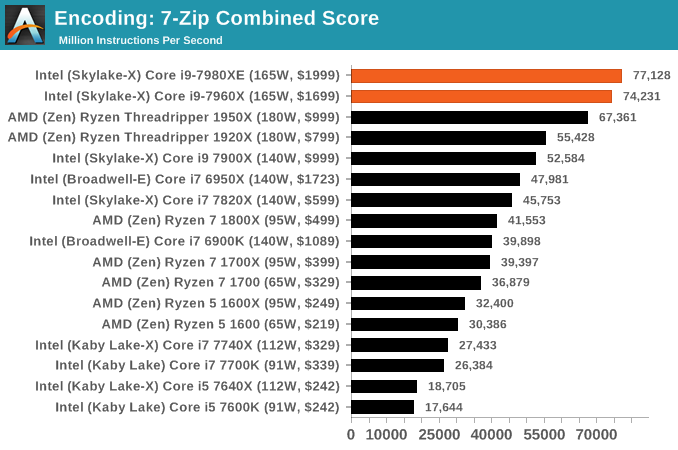
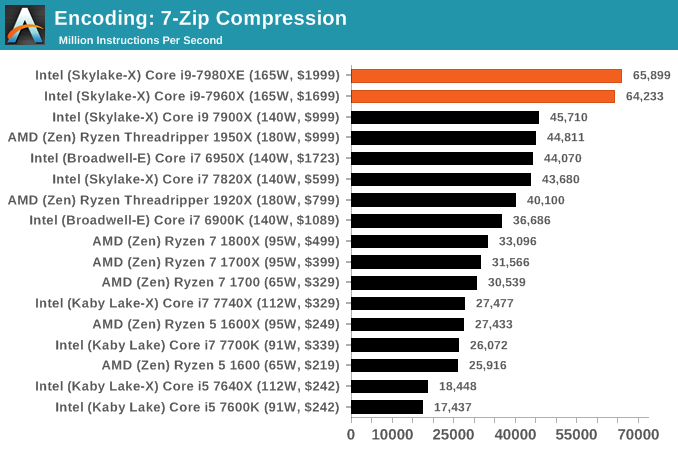
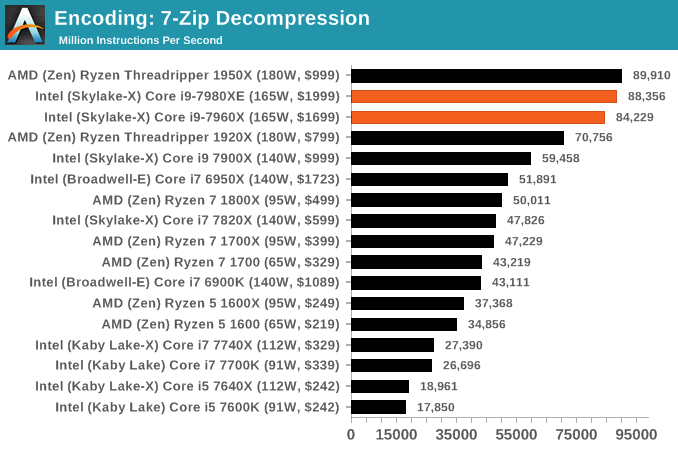
WinRAR 5.40: link
For the 2017 test suite, we move to the latest version of WinRAR in our compression test. WinRAR in some quarters is more user friendly that 7-Zip, hence its inclusion. Rather than use a benchmark mode as we did with 7-Zip, here we take a set of files representative of a generic stack (33 video files in 1.37 GB, 2834 smaller website files in 370 folders in 150 MB) of compressible and incompressible formats. The results shown are the time taken to encode the file. Due to DRAM caching, we run the test 10 times and take the average of the last five runs when the benchmark is in a steady state.
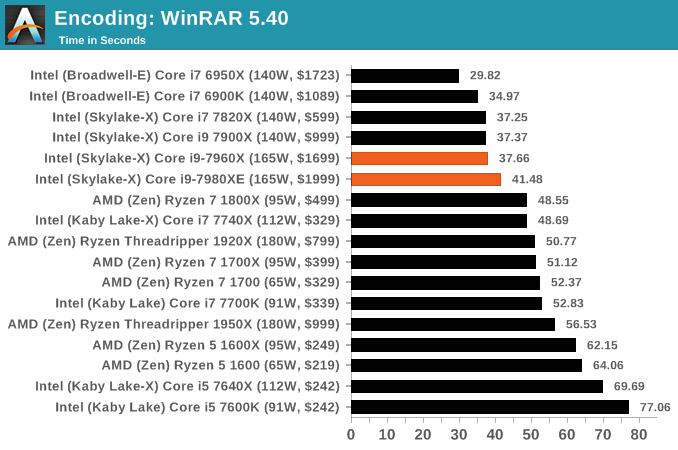
AES Encoding
Algorithms using AES coding have spread far and wide as a ubiquitous tool for encryption. Again, this is another CPU limited test, and modern CPUs have special AES pathways to accelerate their performance. We often see scaling in both frequency and cores with this benchmark. We use the latest version of TrueCrypt and run its benchmark mode over 1GB of in-DRAM data. Results shown are the GB/s average of encryption and decryption.
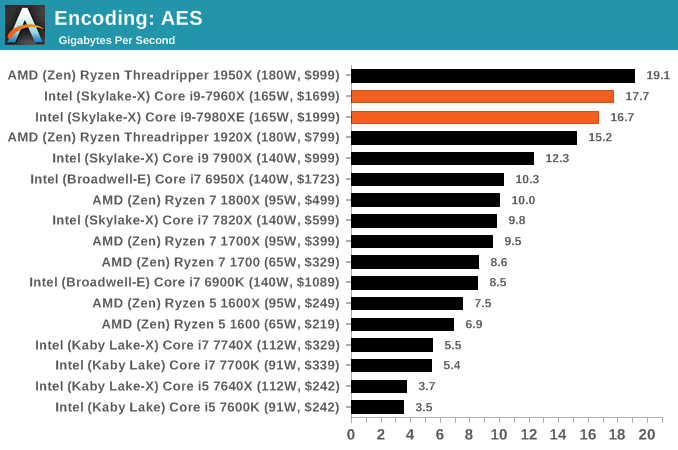
HandBrake v1.0.2 H264 and HEVC: link
As mentioned above, video transcoding (both encode and decode) is a hot topic in performance metrics as more and more content is being created. First consideration is the standard in which the video is encoded, which can be lossless or lossy, trade performance for file-size, trade quality for file-size, or all of the above can increase encoding rates to help accelerate decoding rates. Alongside Google's favorite codec, VP9, there are two others that are taking hold: H264, the older codec, is practically everywhere and is designed to be optimized for 1080p video, and HEVC (or H265) that is aimed to provide the same quality as H264 but at a lower file-size (or better quality for the same size). HEVC is important as 4K is streamed over the air, meaning less bits need to be transferred for the same quality content.
Handbrake is a favored tool for transcoding, and so our test regime takes care of three areas.
Low Quality/Resolution H264: Here we transcode a 640x266 H264 rip of a 2 hour film, and change the encoding from Main profile to High profile, using the very-fast preset.
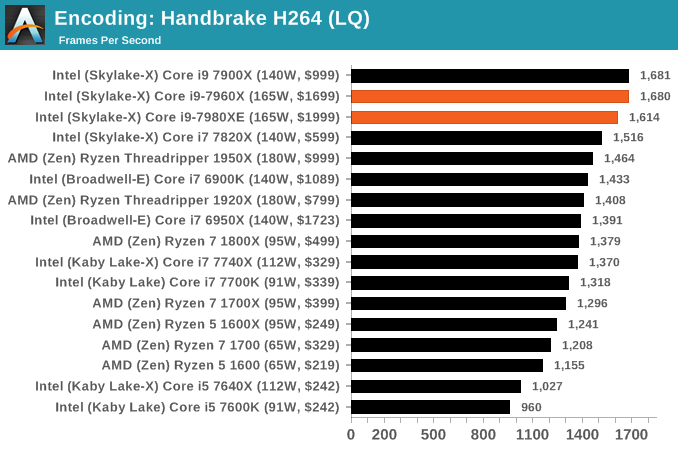
High Quality/Resolution H264: A similar test, but this time we take a ten-minute double 4K (3840x4320) file running at 60 Hz and transcode from Main to High, using the very-fast preset.
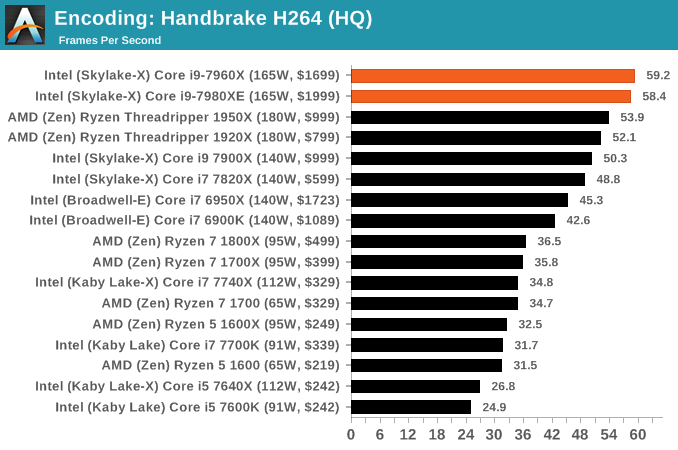
HEVC Test: Using the same video in HQ, we change the resolution and codec of the original video from 4K60 in H264 into 4K60 HEVC.
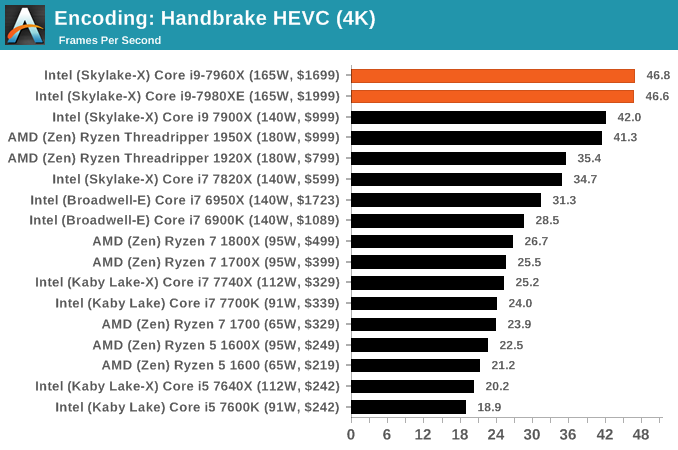










152 Comments
View All Comments
IGTrading - Tuesday, September 26, 2017 - link
Thanks man , after 21 years in IT hardware I don't know ;)Have a fun life and enjoy your "wisdom" :)
whatevs - Tuesday, September 26, 2017 - link
Seeing these new cpus released, sold and used I think Intel has a better idea of what it is doing than you.Good luck competing with Intel in your "experience in the industry" category.
0ldman79 - Wednesday, September 27, 2017 - link
I'm sure he'll be fine.He was here before the "165W" chip and I'm sure he'll be here long after it is gone, same as me.
ZeDestructor - Monday, September 25, 2017 - link
Laptops and tablets break TDP all the time under Turbo loads. I don't see anyone bitching there...0ldman79 - Wednesday, September 27, 2017 - link
It's really no different than if a car was sold with inadequate cooling."Average" heat production at normal speeds is fine, but if you actually come close to using the 300HP the engine produces by, I dunno, pulling a trailer at those same speeds it will overheat and you'll have to pull over and let it cool.
But sure, it's Intel, so it's cool...
HStewart - Monday, September 25, 2017 - link
I have a still running dual Intel Xeon 3Gz 5160 and my biggest complaint is that the box is huge. This machine is 10 years old has 8G of memory and about 5T of storage. It CPU's alone cost around $2000 and in your terms it like the Bentley or my 2000 Toyota Tundra with Lexus Engine with 240,000. In essence you get what you pay for.wolfemane - Tuesday, September 26, 2017 - link
Hate to break it to ya but that Lexus motor IS a Toyota motor. And by going Lexus you way overpaid for a Toyota.Garf75 - Monday, September 25, 2017 - link
Ian, why are there no temperatures posted?extide - Monday, September 25, 2017 - link
Probably because they are highly dependant on the cooler used and the environment it is in. Not really relevant to an article like this.Garf75 - Monday, September 25, 2017 - link
Seriously? As a customer I would want to know if my cooling system is adequate for the job if I'm pushing the CPU.